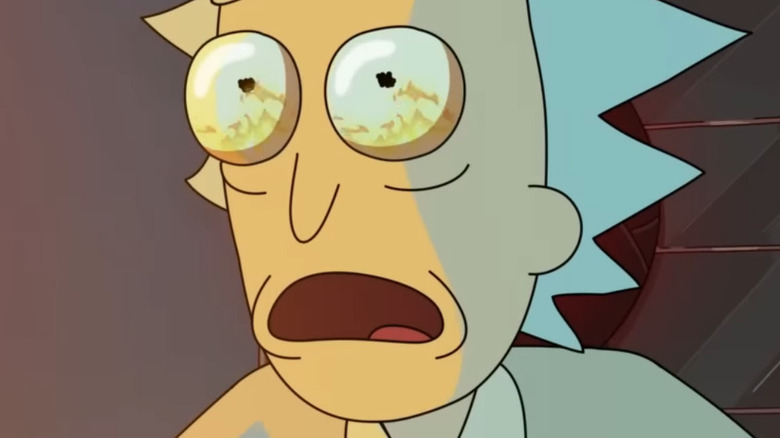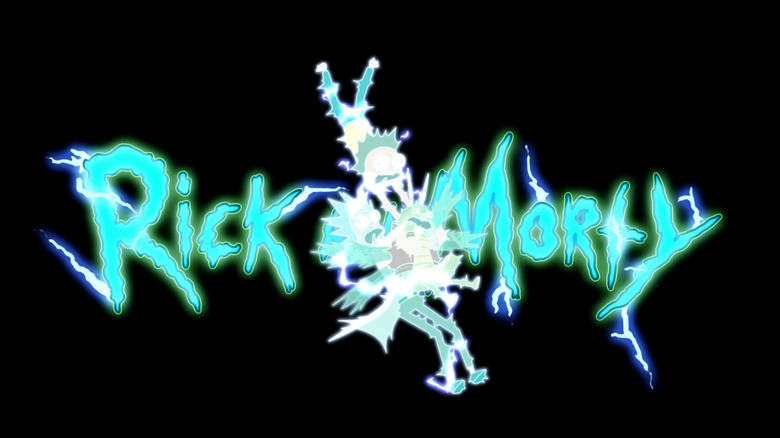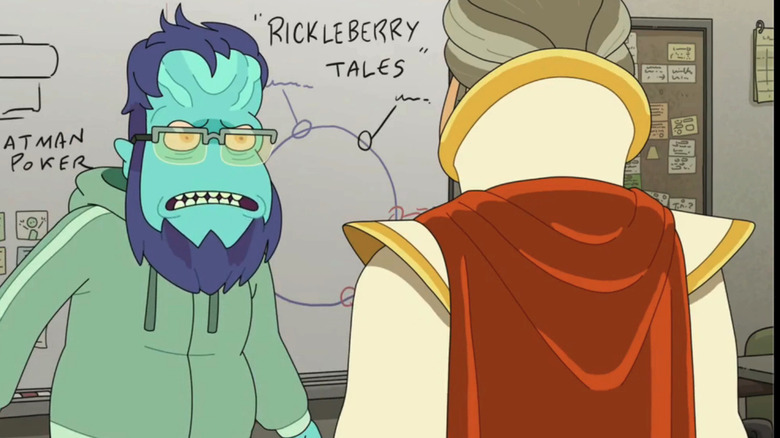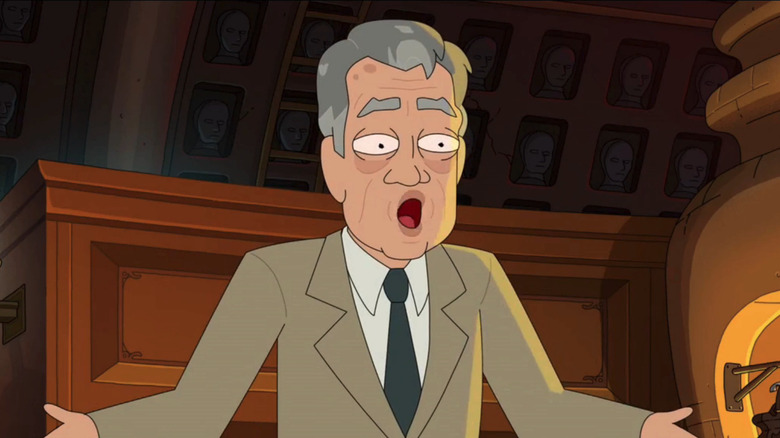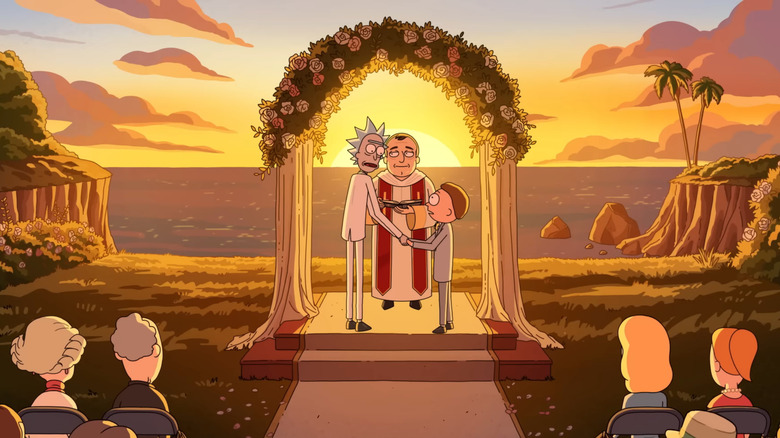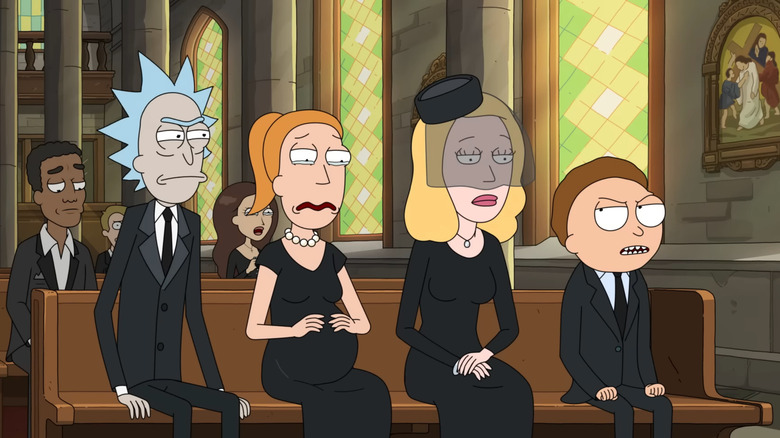Rick And Morty Season 6 Episode 7 Recap: Masters Of The Metaverse
Leave it to "Rick and Morty" to make an episode of television so dense that it seems to be daring recappers to explain it. Fresh off its mid-Season 6 hiatus, Episode 7 is entitled "Full Meta Jackrick." It serves as a follow-up of sorts to the Season 4 episode "Never Ricking Morty," which avid fans will recall as the episode parodying showrunner Dan Harmon's Joseph Campbell-inspired story writing process. But if fans thought that episode was meta, "Full Meta Jackrick" is here to make it feel grounded by comparison. Jesus Christ makes a return, as does Story Lord, but this time Joseph Campbell himself (voiced by Harmon) shows up to push everything way past its logical breaking point.
"Full Meta Jackrick" opens on what appears to be a "previously on" segment, which is itself a meta-commentary on the show's refusal to embrace continuity in an era of serialized television. The sequence starts out with clips from earlier in the season, but becomes progressively weirder until it reaches total surrealism. Rick (Justin Roiland) asks Morty (Justin Roiland) to marry him, and at their vows suggests a sealed chamber as a honeymoon destination. And here is where the episode reveals its conceit: Rick and Morty are under the influence of an alien named Previous Leon (Justin Roiland) a giant, green mosquito-esque creature with the power to affect narrative structure.
Inside the sealed chamber, Rick instructs Morty to continue repeating, "Next time on 'Rick and Morty.'" The phrase counteracts Previous Leon's powers, making him visible. When Rick and Morty fight him, he drags them through the title sequence of the show. It's an especially fun touch that they get electrocuted by the title card before dropping back into the garage.
It's "Rick and Morty" time! Rick and Morty, 100 layers of meta!
Everything is meta and also Jesus Christ is here
In the garage, Morty starts to have an understandable freakout. Previous Leon escapes through a portal that Rick describes as a hole in the fourth wall that leads to the metanarrative layer. Yep, it's about to be that kind of episode.
The two go in search of Previous Leon in the metanarrative layer, which is depicted as a landscape with paths to different story archetypes and tropes. Rick remarks that the entire premise is "A bunch of groan-inducing wordplay for seven TV critics that won't even enjoy it." First of all — ouch? And second of all, yes, accurate.
Rick and Morty find Previous Leon hiding — where else — literally in the weeds. The branches even spell out, "Weeds." But hold on to your plumbuses, folks, because we're only a layer deep in this matryoshka doll of meta. After chasing Previous Leon into a ravine, he starts praying (another callback to "Never Ricking Morty," in which prayer and religious themes are used to stall out the narrative). And just as in that episode, Jesus Christ arrives, with Story Lord returning as well.
Of course, being that the entirety of "Never Ricking Morty" took place inside a toy train sold as a piece of "Rick and Morty" merchandise, Rick has no recollection of either Jesus or Story Lord. Morty, however, has played with the toy train and recognizes them as characters from it. Story Lord explains that he used the Bible story he was locked in at the end of that episode to transcend reality and enter the metanarrative layer. Jesus tears out Previous Leon's wings, then beats the crap out of Rick and Morty, ending with what Rick calls "the Bane," as Jesus drop-slams Rick onto his knee, shattering Rick's spine.
Dan Harmon is Dan Harmon but blue
Before Jesus can finish the job, he's attacked by Previous Leon, who invents a new backstory for Jesus in which he dies of old age. This causes the real Jesus to age and die, too.
Meanwhile, Story Lord declares that his character's motivation is finding a motivation, so he goes in search of the writer who created the story train from "Never Ricking Morty." In a dilapidated toy shop, he finds that the writer is a blue alien who looks suspiciously like "Rick and Morty" writer and showrunner Dan Harmon. He even has Harmon's infamous "story circle" drawn on a whiteboard in his workspace. The writer explains that Story Lord is such a thin character because the Ricks who employed him to write the story for the story train pitched him half-baked ideas and then lost interest in the project. Story Lord begs the writer to give him a motivation, and the writer curtly tells him that his motivation is wanting to find motivation. Unsatisfied, Story Lord kidnaps the writer.
Meanwhile, Rick and Morty bring a captive Previous Leon to the fortress of a group called "The Self-Referential Six," a group of beings with the power to affect narrative structures. One of them creates plot twists, another flashbacks, and a third continuity errors. You get the idea.
After fighting off the Six, Rick locates his target: a prisoner called Brett Con with the power to retroactively change narratives. The Six are keeping him in a prison made of sports, which Rick notes is the opposite of story. When Morty points out that "Rhett Con" would also work, Brett Con demonstrates his power by retroactively making it so that his name has always been Rhett Con.
We are only halfway through this episode.
The Rick with a thousand Morties
Rick asks Rhett Con to retcon him from ever having come to the fortress in exchange for his release, but Rick is forced to release him nonetheless when the Self-Referential Six show up, and Rhett retcons the fortress into an enormous orange.
We pick back up with Rick and Morty trudging through a snowy wasteland, freezing to death because they've been past the fourth wall for too long. As the last of their strength leaks away, they're rescued by a hooded figure. When they wake up, they find themselves in the company of Joseph Campbell.
Joseph Campbell was a literary scholar most notable for his books, "The Hero's Journey" and "The Hero with a Thousand Faces," wherein he established a theory that all stories follow the same basic structure. Dan Harmon, who voices Campbell here, is famously a huge fan of the scholar and based his famous "story circle" on Campbell's so-called monomyth. Campbell's appearance here is either an intentional self-parody on Harmon's part, or an unself-aware deification and hero worship of his biggest influence. Most likely, it's a little of both. On one hand, Campbell asks Rick and Morty to name one good story that doesn't involve an old man with soup, which they immediately do. On the other, the animation team has painstakingly rendered a version of Campbell's actual office.
Regardless, Campbell explains to Rick and Morty that all characters are meta, all nourished and consumed by chaos. He gives them "a map to a region rich in narrative ore." In montage, Rick and Morty build a machine to bring them back into their main reality, all of which is revealed to have been a "previously on" from Previous Leon. When they enter the portal, they're dumped back through the title card.
A very Dan Harmon ending
Meanwhile, Story Lord forces the writer he kidnapped to build a (different) machine that sucks the motivation from everyone in the universe. As the motivation flows from people across the galaxy into Story Lord, Rick and Morty show up to stop him. Rick fights Story Lord, but his newfound motivation makes him nearly invincible, so it's up to Morty to stop the writer from operating his machine. The ghost of Joseph Campbell appears, instructing Morty to tell the writer that he's only proud of his creation's success because he wants to be creative, but that creation has turned him into a villain. To be heroic, he must stop creating. Campbell's speech convinces the writer to stop cranking the machine, and Story Lord loses his motivation, allowing Rick to defeat him.
It's hard to ignore Campbell's influence over both "Rick and Morty" and "Community," especially given the more odious elements of the philosopher's theories. Campbell's monomyth has been criticized for cherry-picked evidence that centered Western forms of storytelling (via The Los Angeles Review of Books). And, in a 1989 article for The New York Review of Books, critic Brendan Gill accused Campbell of antisemitism and anti-Black racism. The elevation of Campbell to sainthood by this episode is enough to raise eyebrows.
In any case, Morty tells the writer that Joseph Campbell wants him to kill Story Lord, and the writer complies, suffocating Story Lord with a Rick plushie toy. Morty burns the story machine, and the writer returns to his sad office, where he has a new idea for a movie. Campbell's ghost tries to stop him from writing it, but the writer can't see him. It feels a lot like a metaphor for Harmon's own self-doubt. Would his hero approve of his work?
When does Rick and Morty Season 6 Episode 8 air?
Rick and Morty Season 6 Episode 8, titled "Analyze Piss," will air at 11 p.m on November 20, only on Adult Swim. The proved episode description reads, "Haters gonna hate." The title is a clear reference to the film "Analyze This," in which a mafia boss goes to therapy, so it seems likely that it will feature a return of the therapist from Season 3's classic episode, "Pickle Rick," who was also teased in the trailer for the back-end of Season 6 (via Adult Swim on YouTube). Will Rick finally be ready to face his greatest enemy of all: himself? And where do the events of "Full Meta Jackrick" leave us going into the next episode?
"Full Meta Jackrick" does very little to advance the overarching plot of "Rick and Morty," leaving its characters back at square one by the time the credits roll, fulfilling Harmon's promise to balance canon with spontaneity. While it's certainly one of the most conceptual and experimental episodes in the show's ever-expanding repertoire, it's mostly a meditation on Dan Harmon's own creative process, demonstrating the thought process he goes through while writing stories. But what does it signify other than Dan Harmon's obsession with the craft of storytelling and a fondness for Joseph Campbell? Perhaps nothing. But maybe that's the point.
